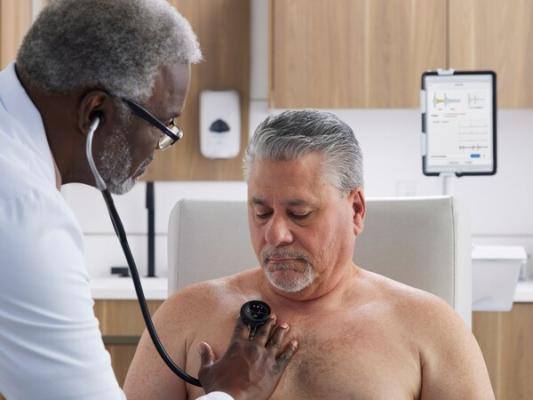
Eko Health's AI-enabled technology marketed as SENSORA
November 14, 2023 — Eko Health, Inc., a leader in AI technology for heart and lung disease detection, today unveiled new clinical data at the 2023 American Heart Association Scientific Sessions. This data demonstrated the real-world clinical efficacy of Eko's AI-enabled SENSORA™ Platform to quickly and accurately detect structural murmurs associated with valvular heart disease. Valvular heart disease (VHD) is a medical condition present in over 50% of adults over the age of 65. VHD can lead to heart failure, stroke, and death, and if left undetected and untreated, can progress from moderate to severe within one year. Unfortunately, symptoms of VHD are frequently nonspecific, and more than half of patients with moderate to severe disease are asymptomatic, making VHD challenging to detect with conventional medical practice.
The study published in Circulation, "Real-World Evaluation of an Artificial Intelligence-Enabled Digital Stethoscope for Detecting Undiagnosed Valvular Heart Disease in Primary Care," evaluated the performance of an Eko digital stethoscope paired with the company's FDA-cleared structural murmur detection algorithm (AI method) versus auscultation with an analog stethoscope in the primary care setting (standard method) in identifying previously undiagnosed VHD. The study found that the AI method showed over two times improvement in the detection sensitivity of VHD associated with a murmur. The AI method performed at 94.1% sensitivity and 84.5% specificity, compared to the standard method of 41.2% sensitivity and 95.5% specificity. Overall, the results indicate that the standard method under-detects across the board, leading to a lower sensitivity when disease is present and higher specificity when disease is not. Accordingly, the AI method identified 22 patients with moderate or greater VHD who were previously undiagnosed, while the standard method identified eight previously undiagnosed patients. These results suggest that using Eko's AI-enabled technology in primary care may significantly increase earlier VHD discovery, facilitate appropriate patient care, and improve outcomes.
"The implications of undiagnosed or late diagnosis of valvular heart disease are dire, as well as costly to our health system," said Lead Author and Principal Investigator Moshe Rancier, M.D., Senior Medical Director of Mass General Brigham Community Physicians in Lawrence, Massachusetts. "This study demonstrates that patients can be more effectively evaluated for VHD in primary care by augmenting the standard cardiac exam with AI-enabled technology."
"These results mark a significant step forward in utilizing AI-powered sensors for upstream cardiovascular disease detection," said Connor Landgraf, Co-founder & CEO of Eko Health. "With over 40 clinical validation and real-world studies initiated, we pride ourselves in developing clinically useful tools that assist clinicians with giving their patients the best care possible."
The study's limitations include the sample size of the study group at 369 patients. However, enrollment is ongoing, and researchers plan to collect up to 12 months of patient follow-up data to evaluate clinical outcomes. Eko's AI-enabled technology is commercially available in the U.S. and marketed to health systems as the SENSORA Platform.
For more information: ekosensora.com


 November 14, 2025
November 14, 2025 









